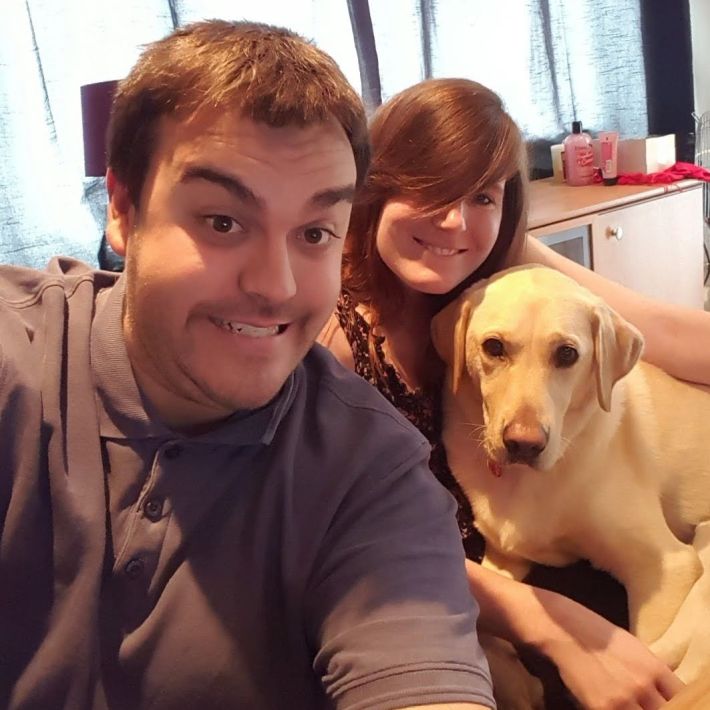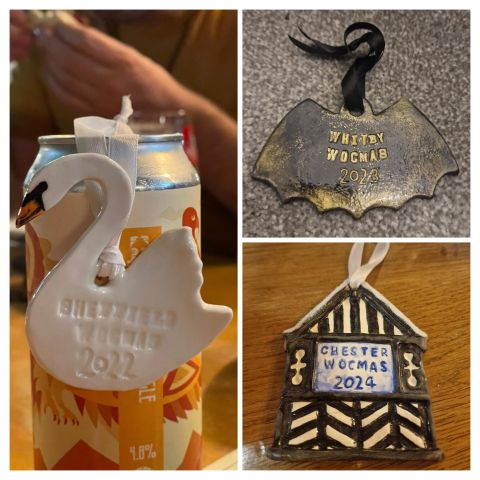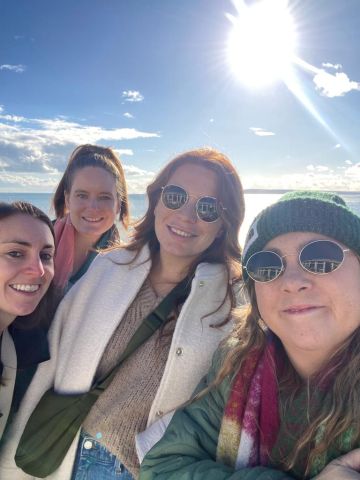Male breast cancer: Navigating life after a rare cancer diagnosis
October 2025
Around 400 men in the UK are diagnosed with male breast cancer each year, compared to 55,550 women, according to Cancer Research UK. To mark Breast Cancer Awareness Month, WAY member Jess shares what happened when her husband Matt was diagnosed in 2017…
“My husband Matt first found a pea-sized lump in his chest in May 2017. He didn’t really think anything of it but went to the doctors anyway. I think in the back of his mind, he was worried straight away.
Matt went for a biopsy within a week. A consultant felt the lump and said, ‘That won’t be anything, you’re too young’. Matt was only 28 at the time. You don’t really think it’s going to be cancer at that age.
Within a month we knew it was breast cancer – it was the aggressive kind and had already spread to his lymph nodes. The cancer was hormone receptive, which gave more treatment options, but it was spreading quickly and Matt started chemo straight away.
The side effects were sometimes awful, and the stress of being so young and facing that was overwhelming. His treatment was every three weeks, with 12 sessions in total, plus hormone treatment. He lost all his hair. He’d find clumps of it on the pillow and eventually just said, ‘I’ve got to cut it’. His mum shaved it off.
After chemo, Matt had a mastectomy. It’s different for men because of the muscle structure, and it took longer to recover. He had drains in and a scar that wasn’t neat. No reconstruction was offered – Matt was told ‘You’re a man, you don’t need it’ – but of course he still felt self-conscious.
He was always the only man on the breast cancer wards and clinics. People often looked at me and then he was the one that was being called in. Nurses sometimes made well-meaning comments like, ‘Oh, it’s so nice to see a man,’ but it just pointed out the difference. His age got mentioned constantly too – ‘You’re so young, you’ll be fine’.

Jess and Matt with Frankie
For a while, things were fine…
Matt finished treatment in March 2018. We got married that October and had an amazing honeymoon in Canada. We had been together since we were teenagers and had been planning the trip throughout his treatment.
For a while things were fine. Then in summer 2020, during the first Covid-19 lockdown, Matt developed a cough and back pain. My immediate thought was that the cancer had returned, but with Covid everywhere we tried to believe it was just that. Appointments and scans were slow, and this time I couldn’t go with him. I had gone to every chemo session before, but Covid meant I had to wait outside or stay home. We were told over the phone that the cancer was back – in his spine and lungs.
Doctors gave Matt maybe two to three years, if treatment worked. Some treatments made him more ill than others, and because of lockdown, we couldn’t really do the things we might have done otherwise. We had our dog then, so walks became our main thing. Family helped where they could, but shielding and infection risk made things quite difficult.
We were both working from home, which I was really grateful for because we could fit work around how Matt was feeling and I could also take him to appointments and care for him.
In October 2021, Matt’s dad died suddenly. Matt went into hospital the day after going to his dad’s funeral. At first, the doctors said it was an infection, that he’d be fine. And then, the day before he died, they said, ‘oh, it’s a 50/50 chance now’. On the last day, Remembrance Day, he was talking and then his lungs just kind of gave up. It was very sudden and traumatic.
He was 32. I was 31.
Life after loss
The weeks afterwards are a blur. I took two months off my work as an accountant, which now feels nowhere near enough. I organised the funeral, went into organisational mode. Then I went back to work three days a week. That first Christmas came only six weeks later and I went through the motions.

I joined WAY Widowed and Young within a month. At first I was just on the Facebook groups, then I started meeting people one-to-one, and eventually went along to my first event. I joined subgroups for WAY members without children and also for people who’ve been widowed very young (WAVY). That was a massive help.
At the beginning, you don’t think anyone would understand. Then you find WAY and it’s just amazing to see everyone and hear their different stories and to realise how everyone can be so connected and understanding. A lot of my best friends now are people I met through WAY.
I also got involved with CoppaFeel’s treks – raising £13,000 and spreading awareness that breast cancer can happen to anyone – even young people and young men. Even though Matt was very private about it, I’m trying to share and talk about it because, as rare as it is, it obviously does happen.

WAVY Weekend in Bournemouth
It’s been nearly four years now since Matt died. I feel more open to doing things like travelling to places and doing things I didn’t get to do when Matt was ill or through the pandemic. I’ve done some trips on my own and with friends. I am just trying to find joy in small things as well.
My work gives me structure. It’s important to find a routine that makes you feel happy but also understand that some days you are going to feel better than others and you need to take time out to grieve as well, which I am terrible at. Your life has changed forever. However you deal with grief as a widow is OK. Try not to let anyone else’s judgement affect you.”

Your donations are always welcome.
Donate